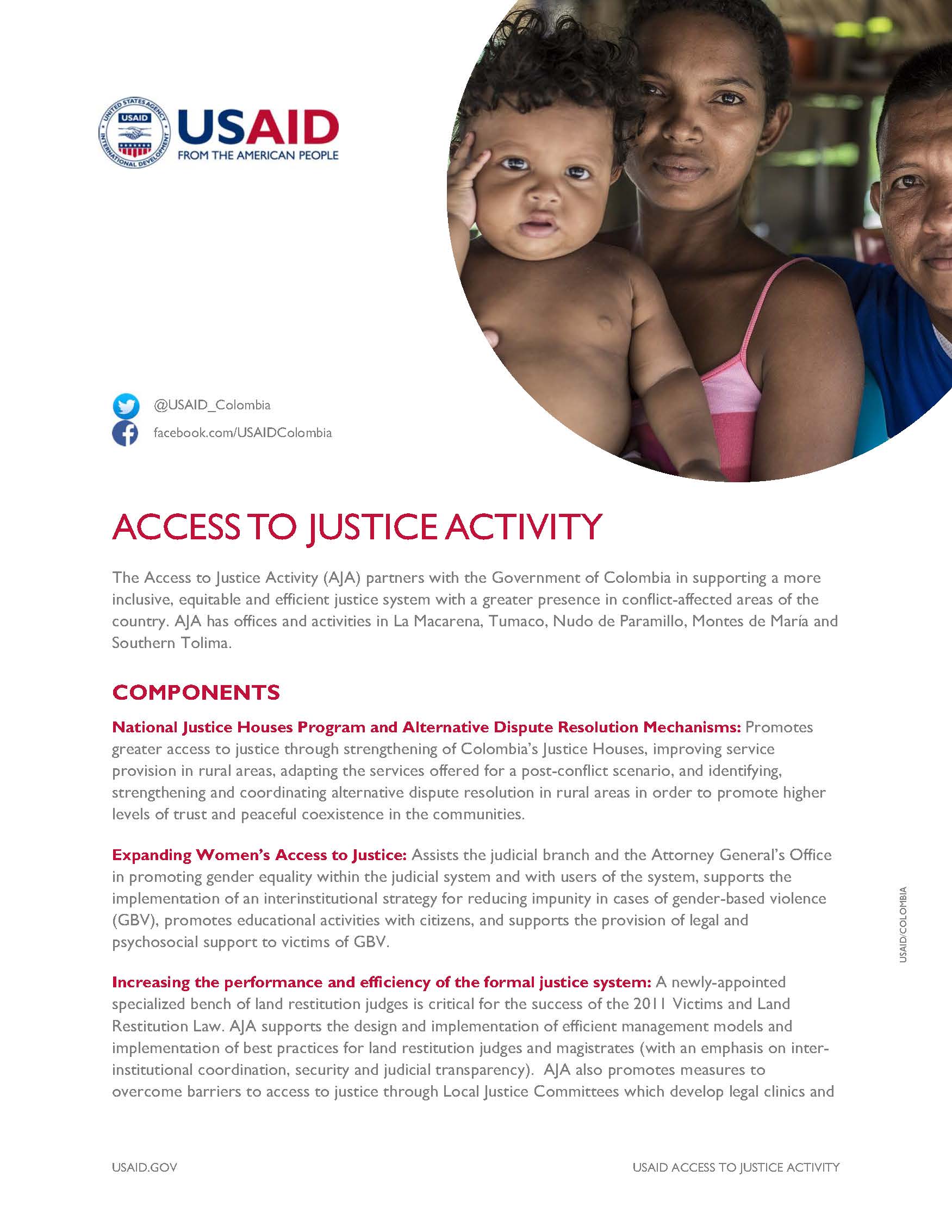Access to Justice Activity ![]() (pdf - 132k)
(pdf - 132k)
The Access to Justice Activity (AJA) partners with the Government of Colombia in supporting a more inclusive, equitable and efficient justice system with a greater presence in conflict-affected areas of the country. AJA has offices and activities in La Macarena, Tumaco, Nudo de Paramillo, Montes de María and Southern Tolima.
COMPONENTS
National Justice Houses Program and Alternative Dispute Resolution Mechanisms: Promotes greater access to justice through strengthening of Colombia’s Justice Houses, improving service provision in rural areas, adapting the services offered for a post-conflict scenario, and identifying, strengthening and coordinating alternative dispute resolution in rural areas in order to promote higher levels of trust and peaceful coexistence in the communities.
Expanding Women’s Access to Justice: Assists the judicial branch and the Attorney General’s Office in promoting gender equality within the judicial system and with users of the system, supports the implementation of an interinstitutional strategy for reducing impunity in cases of gender-based violence (GBV), promotes educational activities with citizens, and supports the provision of legal and psychosocial support to victims of GBV.
Increasing the performance and efficiency of the formal justice system: A newly-appointed specialized bench of land restitution judges is critical for the success of the 2011 Victims and Land Restitution Law. AJA supports the design and implementation of efficient management models and implementation of best practices for land restitution judges and magistrates (with an emphasis on inter-institutional coordination, security and judicial transparency). AJA also promotes measures to overcome barriers to access to justice through Local Justice Committees which develop legal clinics and public policies. AJA also supports the Inter-sectoral Commission for the Monitoring of the Criminal Accusatory System.
KEY ACHIEVEMENTS
- AJA assisted justice operators in conflict-affected municipalities in delivering justice services to isolated communities. Mobile Justice Brigades provided 10,502 rural citizens with legal and administrative state services. For many recipients, this was their first interaction with the State to receive justice services.
- 1,527 community leaders, judges and officials trained in alternative justice services, GBV (including sexual violence in the context of the armed conflict) and land restitution.
- 2,465 requests for legal assistance were received by the legal clinics of AJA’s partner universities in conflict-affected municipalities; 60 percent in rural areas. Where the internal armed conflict still poses security challenges, the program is developing virtual models through digital kiosks provided by the Ministerio de Tecnologías de la Información y las Comunicaciones. Tumaco’s Virtual Legal Clinic has been consulted by 2,873 users and has provided orientation in civil and family law to 2,067 citizens in its first year of implementation.
- Creation of 23 Local Justice Committees and strengthening the six already in existence; local municipalities allocated $560,000 for access to justice initiatives to be carried out by the 29 Local Justice Committees.
- Participation of indigenous authorities in the Local Justice Committees and in the development of 18 municipal and five regional justice system coordination protocols.








Comment
Make a general inquiry or suggest an improvement.